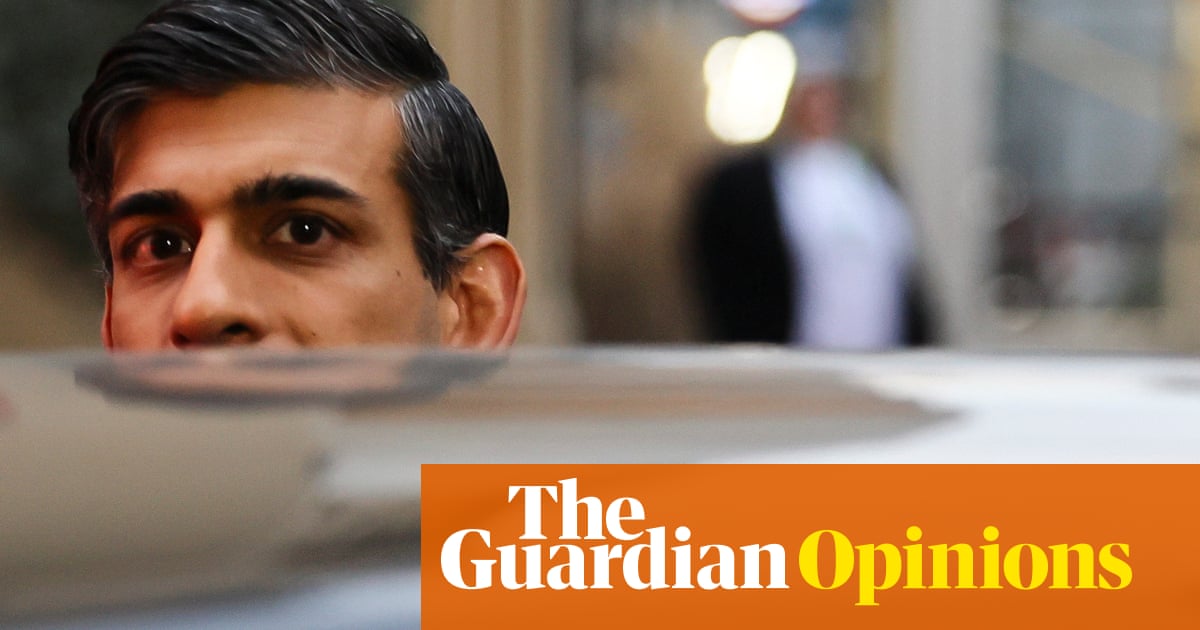
Rishi Sunak sits in the office of prime minister as if placed there on secondment from some other Conservative party – one that hasn’t been in power for 13 years. If there is credit for trying to fix things that are broken about Britain, he will claim it, but accountability for the breakage is not his concern.
He chose not to express a view on Monday when MPs endorsed the report that censured Boris Johnson for lying wilfully and repeatedly to parliament. Sunak said he respected the committee that investigated his predecessor but, speaking as head of the government, preferred not to meddle in matters for the legislature.
That excuse doesn’t even work as a constitutional fig leaf. The prime minister is also an MP and a citizen. He is allowed an opinion on whether politicians should tell the truth.
As leader of his party, mindful of public opinion, he might also have wanted to signal that Johnson’s duplicities deserve formal rebuke. Even if the ethical imperative passed him by, he could have spied an electoral advantage in siding with the people who felt the personal sacrifices they made for Covid lockdowns were derided when the man who wrote the rules also flouted them.
The real reason for Sunak’s abstention was hope of an end to hostile manoeuvres from Johnson and his allies. To choose appeasement of implacable foes over alignment with millions of voters is gutlessness without guile; the stupidest kind of cowardice.
As a rule, if a prime minister’s first pledge in office is to govern with “integrity, professionalism and accountability”, and he is later asked if that commitment still stands, the answer should sound something like yes.
Sunak’s promise of probity on the threshold of No 10 always had a whiff of John Major’s “back to basics” campaign about it – a piety so vague and vast as to be meaningless, except as a device for organising every subsequent scandal and mishap into a pattern of systemic hypocrisy.
Every prime minister wants to signal a fresh start, and for Sunak there was the added urgency of burying Liz Truss’s short, calamitous reign. That was more than a party-political mission. Truss’s adventures in budget policy cost Britain its credibility with financial markets. The country faced relegation from the tier of developed democracies that reliably manage their debts.
Conservative MPs desperately needed a replacement prime minister with a reputation for economic sobriety. Sunak, the chancellor who navigated the pandemic to general acclaim and then watched from the backbenches as the economy went into a tailspin, was the obvious candidate.
The contrast with Truss gave Sunak a more potent aura of renewal than he deserved. The expedient of short-term stabilisation after a financial emergency laundered memories of the new prime minister’s loyal service to Johnson, whose disgrace receded momentarily from view behind the spectacular implosion of his successor.
But Truss’s premiership is better understood as an extension of the “Boris” franchise. She beat Sunak as a continuity candidate. Or rather Sunak lost because Tory grassroots members despised him as Johnson’s assassin. What followed was like a disastrous spin-off show devoted to a minor character in a longer-running series. It was the familiar script of Johnsonian bluster but in the mouths of a weaker cast performing to an audience of unamused bond traders.
Kwasi Kwarteng’s “mini-budget” of September 2022 was reckless because it offered lavish tax cuts with no projection of compensating revenues beyond faith in the lucrative proceeds of growth to be conjured by the animal spirits of unleashed enterprise.
But that alone might not have caused a financial derailment, had Truss and Kwarteng not also made a great show of contempt for what they saw as economic “orthodoxy”. In her leadership bid, Truss had casually queried the Bank of England’s independence in ways that alarmed the City. On arrival in Downing Street, she sacked Tom Scholar, the respected permanent secretary at the Treasury. The Office for Budget Responsibility was blocked from vetting Kwarteng’s numbers. When markets flinched from his unfunded tax cuts, he went on television and promised “more to come”. Flinch turned to flight, and the whole budget had to be scrapped.
Britain is still paying the price. The current cost of living crisis has causes that predate Kwarteng soiling the national balance sheet, but the immediate cost to the exchequer was somewhere in the order of £30bn. Interest rates would be rising anyway to contain inflation, but Trussonomics gave mortgage holders an early punch in the guts.
Shredding trust among international lenders also limited future fiscal bandwidth. Having blown the right to mark their own economic homework, the Tories locked Britain on to a path of performative budget discipline that amounts to punitive austerity.
Sunak is silent about both the economic pain that people are suffering and the reason. That might indicate deficient empathy, but it is mostly a function of his unwillingness to examine the causes of any problem that Britain faces when there is no way to tell the story without taking a portion of blame.
It is the reason why he cannot call Johnson a liar or say, as some Tory MPs managed to do in the Commons on Monday, that deliberate lying from the dispatch box is an act of sabotage against democracy. He cannot articulate a simple constitutional principle – that a prime minister who is found to have broken the rules must be punished because the alternative is a system where executive power comes with an exemption from accountability.
Johnson entered Downing Street with that spirit of contempt for anything that might restrain a leader’s impulse, then passed it on to Truss. It is their combined legacy that Sunak will not repudiate, even as he presents himself as a different kind of leader from a different Conservative party.
There is a way to rationalise the decision not to provoke Johnson with an explicit endorsement of the privileges committee’s verdict. Although the former prime minister enjoys less support among Tory MPs than he might like, his base is noisy and effective at commanding media attention. Their silence buys Downing Street time to talk about other things.
But a truce can only be temporary. The vendetta is personal. And even if Johnson’s star wanes he represents a wider Tory tendency that needs Sunak’s project to fail; that cares only about another Conservative party waiting to emerge on the other side of election defeat. That party will have to decide if it thinks integrity, professionalism and accountability matter in politics. It isn’t a hard question. But it will hound the Tories into opposition because Sunak is too weak to answer it in government.
Rafael Behr is a Guardian columnist












